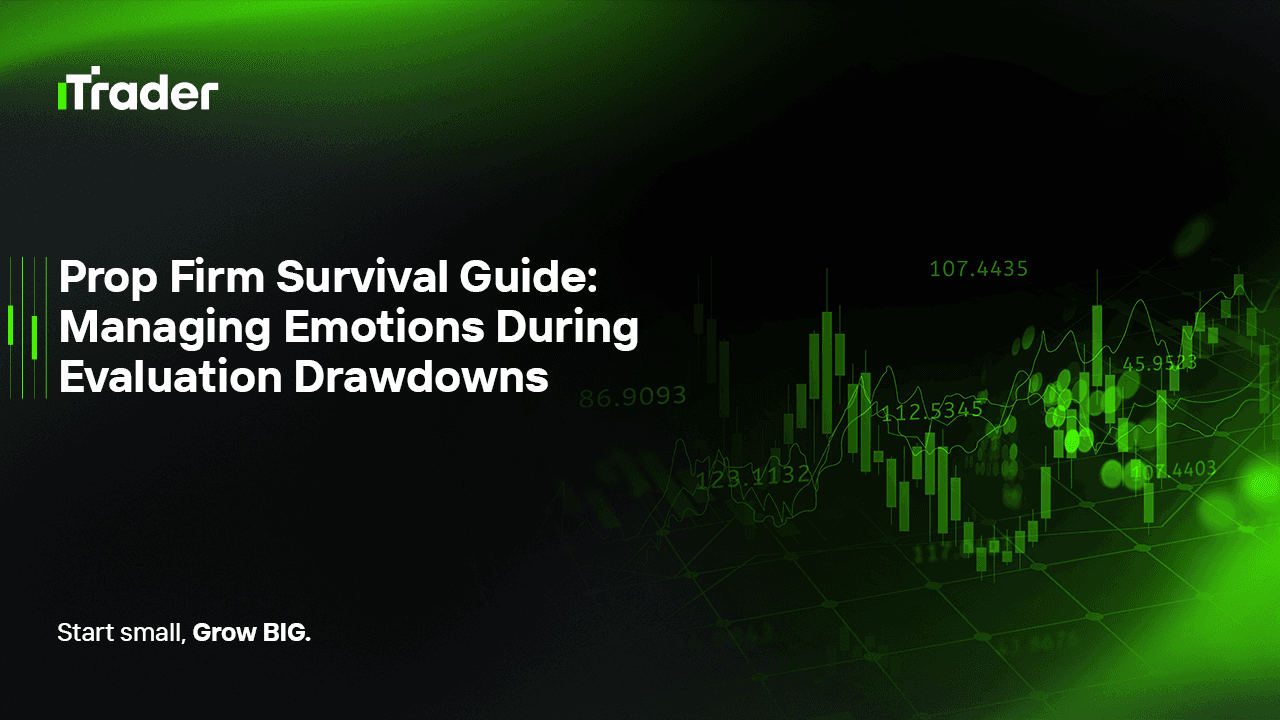2025-09-26
Prop firm challenges have become a gateway for aspiring traders to access larger trading capital. Passing such an evaluation means you can move beyond trading with your own limited funds and manage a professionally funded account. But behind this opportunity lies strict rules, unforgiving risk limits, and a true test of a trader’s discipline.

Most new traders prepare heavily on the technical side—indicators, strategies, backtests—yet they overlook the psychological challenge. The truth is that many traders fail not because of poor systems, but because they could not control their emotions when equity dropped. Drawdowns, in particular, are the most critical mental test.
This article explains what drawdowns are, why they matter in prop challenges, the emotional struggles they bring, and most importantly—how to manage them like a professional while staying beginner-friendly in approach.
A drawdown represents the decline in your account’s equity from its peak to the lowest point. For example:
Prop firms enforce strict limits such as:
Breaking either limit results in immediate disqualification, regardless of prior profits. That’s why drawdowns aren’t just numbers—they are the ultimate test of your risk management and discipline.
A drawdown is not just financial—it’s psychological. Traders under pressure often experience:
The thought of “I’m going to fail this challenge” leads to hesitation or closing trades too early.
Believing “The market is against me” can trigger impulsive decisions, breaking rules in search of quick revenge.
“I’m not good enough to be a trader” erodes confidence, leading to missed opportunities or giving up entirely.
The urge to win back losses quickly leads to oversized positions and risk-taking that only deepens the drawdown.
These emotions, if unmanaged, push traders into a downward spiral that usually ends with failing the challenge.
Have mechanical stop-points before emotions take over:
Such rules keep you from emotional overtrading.
Accept that drawdowns are part of the game, not proof of incompetence. Every system has natural fluctuations.
When emotions spike, step away. Deep breathing, a short walk, or even 10 minutes of detachment can reset your decision-making clarity.
Document how you feel during drawdowns. Over time, patterns emerge, giving you awareness of triggers that lead to mistakes.
Professional traders use meditation and visualization to mentally prepare for drawdowns, training the mind to stay calm under stress.
Experienced traders emphasize:
As one seasoned trader put it:
“You cannot control the market, but you can always control your response to it.”
Passing a prop firm challenge requires more than a profitable system. The real difference between those who succeed and those who fail lies in emotional control during drawdowns.
If you can:
you won’t just survive the challenge—you’ll build the foundation for a sustainable trading career.
In the end, the goal is not just to win trades, but to survive long enough to succeed.
© 2025 iTrader Global Limited|会社登録番号:15962
iTrader Global Limitedは、コモロ連合のアンジュアン自治島ムツァムドゥのHamchakoに所在し、コモロ証券委員会によって認可・規制を受けています。ライセンス番号は L15962/ITGL です。
iTrader Global Limitedは「iTrader」の商号で運営しており、外国為替取引業務を行う許可を受けています。会社のロゴ、商標、ウェブサイトはすべて iTrader Global Limited の専有財産です。
iTrader Global Limitedの他の子会社には、iTrader Global Pty Ltd(オーストラリア会社登録番号(ACN):686 857 198)が含まれます。 この会社は、Opheleo Holdings Pty Ltd(オーストラリア金融サービスライセンス(AFSL)番号:000224485)の認可を受けた代表者(AFS代表番号:001315037)です。登録住所は Level 1, 256 Rundle St, Adelaide, SA 5000 です。
免責事項: この法人は、本ウェブサイト上で取引される金融商品の発行者ではなく、それらに対して責任を負いません。
リスク警告: 差金決済取引(CFD)は、レバレッジにより資本の急速な損失リスクが高く、すべての利用者に適しているとは限りません。
ファンド、CFD、その他の高レバレッジ商品を取引するには、専門的な知識が必要です。
調査によると、84.01%のレバレッジ取引者が損失を被っています。取引を開始する前に、リスクを十分に理解し、資金を失う可能性があることを認識してください。
iTraderは、レバレッジ取引によるリスク、損失、またはその他の損害について、個人または法人に対して一切の責任を負わないことを明言します。
利用制限: iTraderは、法律、規制、または政策によりこのような活動が禁止されている国の居住者を対象として、本ウェブサイトやサービスを提供していません。